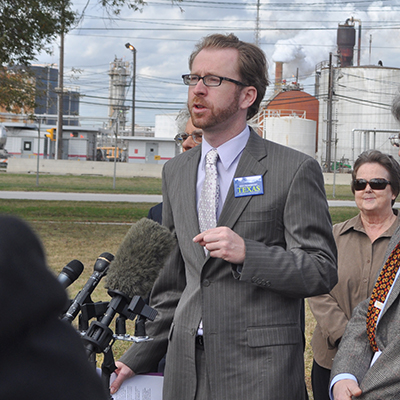
Testimony on HB 2483 to ban bee-killing pesticides
Texas is experiencing the best wildflower season in a decade. Everywhere you look you’ll see incredible displays of bluebonnets. TxDOT is responsible for a lot of these, planting 30,000 pounds of wildflower seeds every year. But our iconic state flower wouldn’t bloom without the help of bees and other pollinators. We count on bees to help make our state so beautiful, and by planting those seeds we attract the bees to come to our roadsides. But those roadsides might be poisoning the very bees we count on to make our roadsides beautiful.
Written testimony in support of HB 2483 (Farrar)
Dear Chairman and Members,
I write to you in support HB 2483 to ban the use of bee-killing neonicotinioid pesticides along the rights of way of state roads.
Texas is experiencing the best wildflower season in a decade. Everywhere you look you’ll see incredible displays of bluebonnets. TxDOT is responsible for a lot of these, planting 30,000 pounds of wildflower seeds every year. But our iconic state flower wouldn’t bloom without the help of bees and other pollinators. We count on bees to help make our state so beautiful, and by planting those seeds we attract the bees to come to our roadsides. But those roadsides might be poisoning the very bees we count on to make our roadsides beautiful.
Bees are important for more than just flowers. Critically, they also pollinate about 1/3 of the food supply, including most of our fruits, vegetables, and nuts, as well as hay for animals. Their work accounts for approximately $15 billion worth of crops each year. Bees are responsible for helping feed the world. This all amounts to make their recent decline incredibly alarming. 30% of honeybees are lost each winter, which is twice the loss deemed economically tolerable. Wild bees are in decline as well— the Texas Parks and Wildlife Department marks 17 native species that are similarly declining. A number of factors play into this, however I will be focusing specifically on the harm caused by neonics.
Erik Stokstad’s article, “European Agency Concludes Contrversial ‘Neonic’ Pesticides Threaten Bees,” describes neonics as systemic pesticides—they coat seeds and allow the pesticide to spread throughout the plant in order to protect it from nibbling insects. The problem is that this causes the pesticide to work its way into the pollen and nectar, where it can affect the bees who are simply trying to pollinate the plant. Their use on crops also allows the pesticides to spread far and wide, and subsequently be absorbed by the wildflowers that bees also pollinate.
Neonics belong to a category known as ‘sublethal stressors.’ Specifically, that means that while they don’t kill the bees directly, they attack their brains and hinder learning, navigation, and reproduction. For bees, who often have to travel great distances to collect pollen and nectar from sometimes hard-to-find flowers, and must then navigate back to their hives afterward, this is as good as a death sentence. They rely on a finely tuned sense of spatial awareness and on diligent memorization of the paths that they take to return home—both of which are wiped out if they come into contact with neonics.
Last year, the European Food Safety Authority, after analyzing 588 studies, concluded that neonics pose a risk to both managed honeybees and wild bees. The EU subsequently banned the use of 3 neonics on flowering field crops, and are considering a partial ban on all crops. Here in the U.S., Home Depot and Lowes have both phased neonics out of use, and Ace Hardware has recently announced that they are joining them. In the state’s pollinator protection plan, TPWD warns that the use of pesticides in areas managed for native insect pollinators should be avoided.
As a result, this bill is an important first step to protecting bees from the threat of bee-killing pesticides. The state of Texas should by example and make sure our wildflower-covered roadsides don’t harm the bees on which we count on for so much.
Authors
Luke Metzger
Executive Director, Environment Texas
As the executive director of Environment Texas, Luke is a leading voice in the state for clean air and water, parks and wildlife, and a livable climate. Luke recently led the successful campaign to get the Texas Legislature and voters to invest $1 billion to buy land for new state parks. He also helped win permanent protection for the Christmas Mountains of Big Bend; helped compel Exxon, Shell and Chevron Phillips to cut air pollution at four Texas refineries and chemical plants; and got the Austin and Houston school districts to install filters on water fountains to protect children from lead in drinking water. The San Antonio Current has called Luke "long one of the most energetic and dedicated defenders of environmental issues in the state." He has been named one of the "Top Lobbyists for Causes" by Capitol Inside, received the President's Award from the Texas Recreation and Parks Society for his work to protect Texas parks. He is a board member of the Clean Air Force of Central Texas and an advisory board member of the Texas Tech University Masters of Public Administration program. Luke, his wife, son and daughters are working to visit every state park in Texas.

